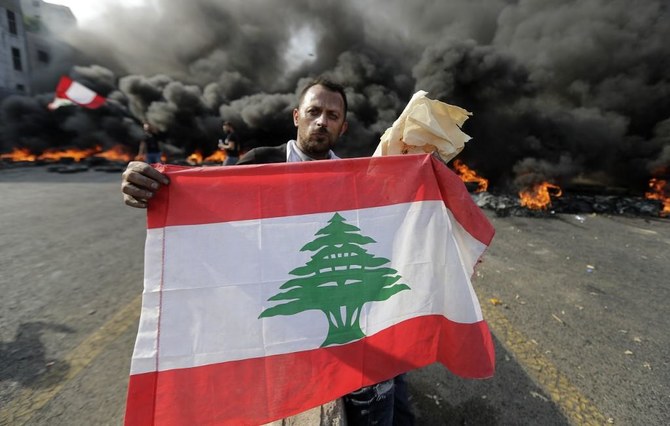BEIRUT: Protesters across Lebanon blocked roads with burning tires on Friday and marched in Beirut for a second day of demonstrations targeting the government over a deep economic crisis.
In Lebanon’s biggest protest in years, thousands of people gathered outside the government headquarters in central Beirut on Thursday evening, forcing the cabinet to backtrack on plans to raise a new tax on WhatsApp voice calls. Tear gas was fired as some demonstrators and police clashed in the early hours.
Fires lit in the street in central Beirut were smoldering on Friday morning. Pavements were scattered with the glass of several smashed shop-fronts and billboards had been torn down.
Protesters blocked roads in the north, the south and the Bekaa Valley, among other areas, the National News Agency (NNA) reported. Schools were closed on the instructions of the government.
Two foreign workers choked to death from a fire that spread to a building near the protests in Beirut, the NNA said.
This was the second wave of nationwide protests this month.
In a country fractured along sectarian lines, the unusually wide geographic reach of these protests has been seen as a sign of deepening anger with politicians who have jointly led Lebanon into crisis.
READ MORE: Lebanese PM gives government 72 hours to back his reforms as protests rage
The government, which includes nearly all of Lebanon’s main parties, is struggling to implement long-delayed reforms that are seen as more vital than ever to begin resolving the crisis.
The Lebanese newspaper an-Nahar described it as “a tax intifada,” or uprising, across Lebanon. Another daily, Al-Akhbar, declared it “the WhatsApp revolution” that had shaken Prime Minister Saad Hariri’s unity government.
Seeking ways to boost revenues, a government minister on Thursday announced plans to raise a new fee of 20 cents per day for calls via voice over Internet protocol (VoIP), used by applications including Facebook-owned WhatsApp.
But as the protests spread, Telecoms Minister Mohamed Choucair phoned into Lebanese broadcasters on Thursday evening to say the proposed levy on WhatsApp calls had been revoked.
Shattered by war between 1975 and 1990, Lebanon has one of the world’s highest debt burdens as a share of its economy. Economic growth has been hit by regional conflict and instability. Unemployment among those aged under 35 runs at 37 percent.
The kind of steps needed to fix the national finances have long proven elusive. Sectarian politicians, many of them civil war veterans, have long used state resources for their own political benefit and are reluctant to cede prerogatives.
The crisis has been compounded by a slowdown in capital flows to Lebanon, which has long depended on remittances from its diaspora to meet financing needs, including the state’s deficit.
The financial crunch has added to the impetus for reform but the government’s steps have yet to convince foreign donors who have offered billions in financial assistance conditional on changes.
The strains have emerged recently in the real economy where importers have been unable to secure dollars at the pegged exchange rate.
The cabinet is due to meet on Friday at the presidential palace in Baabda in what a minister has said would be the final session to discuss the 2020 state budget.
































